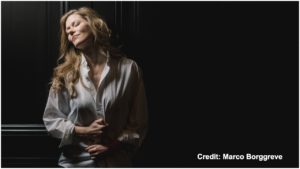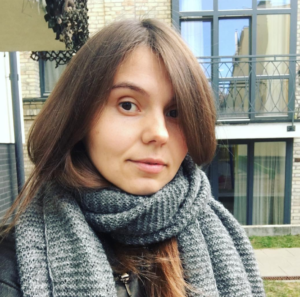
Creating Her Own Way – Soprano And Conductor Barbara Hannigan On Conducting, Equilibrium Project, And Ojai Festival
By Polina LyapustinaBarbara Hannigan doesn’t like being called a genius.
“I work hard,” she always retorts. And that’s true. To catch Barbara Hannigan for an interview is very tricky. At the time of this interview, the soprano has just finished her work in Copenhagen, where she performed as a conductor alongside the young artists from her Equilibrium project, and also sang Abrahamsen’s “Let me tell you,” a contemporary piece written for her and with her participation. Though, she apparently doesn’t like to identify herself as a face of contemporary opera, she is well-known for her contributions to it and wants moves forward with it.
After some busy weeks in Munich, a European tour of Stravinsky’s “The Rake’s Progress” until the end of May, Hannigan is set for the Ojai Festival in June.
After years of exploring untouched ground, now it seems that Hannigan is ready to not just to inspire but to share her experience and her approach with other musicians. Or maybe she is looking for a new direction among them. Now she is calmer, more thoughtful and reasonable. Another day — another state of this amazing creative animal, whose career is a perfect example of the limitless self-development.
Equilibrium Project
These days Equilibrium is at the top of her interests. The way she communicates with young artists is quite far from teaching. One of the main points musicians comprehend in the Equilibrium project is that collaboration at each stage, as well as an understanding of the whole process, is the key to success.
“I think it is very helpful when we have an understanding of all the aspects of our chosen field: it helps us to have patience, compassion, and confidence in a situation which can run with very high tensions and stress. I am curious and love to continue learning all the time,” Hannigan told OperaWire.
People always mention, how attentive Barabara Hannigan is to different aspects of every project, so she learned a lot from many professionals. Who gave her the most important lesson in life?
“I cannot say one person. I think it is a talent to be able to find mentors and teachers everywhere, and I have been working to always develop this talent. Then we are all in an exchange of give and take, which helps the creative flow.”
In fact, she notes that she learns as much from young professionals as they do from her.
“Equilibrium artists are young professionals — and I am always concerned to stress that they are not students, any more than I am. We are indeed working as colleagues, and I think we help to lift one another. I imagine they gain a lot from the way we are working, and I am certainly learning, from them and their perspectives.”
But she definitely has something to share and to teach — her approach to music-making is significant. “Incorporate the music. By this I mean: become the music.”
Singing Conductor
And it seems like “become the music” worked out for her and helped her to extend her singing career to conducting.
“In a way, it was a natural development for me, though perhaps I did not realize it at the time,” Hannigan revealed. “I have added repertoire step by step, using dramaturgy as the kind of basis for almost every program. I try to balance singing and conducting engagements so that I have periods of the year when I am ‘just’ singing. And it is a joy for me to work in this way with my instrumental colleagues.”
The singing conductor is obviously a challenge. And she is okay with it, but just needs to be careful and attentive to her own conditions. She never forgets about her powerful soprano instrument and tries to set aside time for “just singing.” But even “just singing” means a lot more.
“If I look at my career, 25 years, I can say that at least in the European scene where I have mainly worked, the audiences are absolutely interested in opera productions which have both the strong musical and dramatic aspects,” the soprano noted. “They are affected by singers who both can sing AND who are interested in the theatrical aspect of telling the story. The days are drawing short where singers can just come for a few days of the rehearsal process and go and stand where they are told to stand, and sing. My feeling is that now, the entire team is very intensely committed to the full potential of the opera experience.”
And what is her way to be convincing and to learn from her roles? She always says that she loves broken characters and their catharsis in operas.
“My favorite roles are the ones with many, many questions. Ones that can be explored from various angles and there is not ONE true path. Therefore: Lulu, Melisande, and Marie in ‘Die Soldaten,’ as well as Elle in ‘La Voix Humaine’ have given me a lot of inspiration. Also, the two operas I sang of George Benjamin, especially Agnes in ‘Written on Skin,’ were very formative experiences for me.”
New Horizons
But the time for singing seems very far now, the next major stop is California.
“I’m thrilled to have this position at Ojai — the 74th year of the festival — and to join the long list of yearly music directors there. It is a beautiful place with a generous spirit, and the audiences are open and curious!”
She has chosen a nice repertoire featuring her favorites, such as Debussy, Rachmaninoff, Stravinsky, and Gershwin. They will also perform “The Rake’s Progress” with Equilibrium.
“…the other composers I have programmed at Ojai are John Zorn, James Dillon, Terry Riley, Claude Vivier, and Gerard Grisey. I don’t think of any as ‘safe or unsafe’ — I have programmed what I feel is really great music!”
And that is how she moves in her own way — with the music she finds really great. With new operas either old masterpieces, when teaching either learning, conducting or singing, Barbara Hannigan is a great example of “What if” and “Listen to yourself” ideas. A genius and definitely a hard working person, she remains a potent engine of the opera industry, giving it an opportunity to move forward with no borders, because she’s already got past them.



